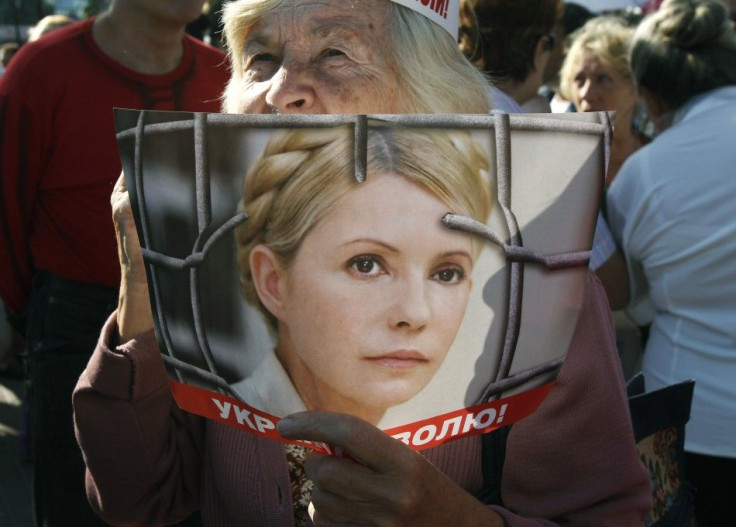The Return Of Sports Boycotts? Germany May Skip Euro 2012 Games In Ukraine

Germany has threatened to boycott the upcoming Euro 2012 soccer tournament to protest the imprisonment and alleged mistreatment of Ukrainian opposition leader Yulia Tymoshenko, who is on a hunger strike at a prison camp.
According to Der Spiegel, Chancellor Angela Merkel may order members of the government not to attend the games, and German ministers have implied that the tournament should be moved out of Ukraine and even that Ukraine should be removed from the international tournament all together.
Visits by ministers or prime ministers are out of the question under the current circumstances, Environment Minister Norbert Röttgen told Bild.
The Ukrainian government should immediately release Ms. Tymoshenko to freedom.
In October, a Kiev court found Tymoshenko, a former prime minister, guilty of abusing her powers by signing a 2009 gas deal with Russia and sentenced to seven years in prison. She has also been accused of embezzling $405 million in government funds when she was head of the state-run United Energy Systems in the 1990s.
Tymoshenko denies the charges and her supporters, along with the European Union and Russia, have decried her trial and conviction as a political vendetta by President Viktor Yanukovych.
Germany's new president Joachim Gauck has already turned down an invitation for a special summit in Ukraine, while the presidents of Austria, the Czech Republic, Germany, Italy and Slovenia, and high ranking EU officials have also canceled visits, according to the BBC.
Now, Kiev, angered by the talk of boycotts, has accused Merkel of using Cold War tactics.
We would not like to think that the political leaders of Germany are capable of reviving the methods of the Cold War and making sport a hostage of politics, foreign ministry spokesman Oleg Voloshyn told the Interfax-Ukraine news agency, according to the Telegraph.
We would like to think we are just talking about a false media report here.
Politics and sports have long gone hand-in-hand -- from the Nazi-led Berlin Olympics in 1936 to Boston Bruins' goalie Tim Thomas refusing to meet with President Barack Obama -- and the boycott is a very powerful tool. Bishop Desmond Tutu once credited the 20-year international boycott of South African sports clubs persuading the supporters of apartheid to change their ways.
The 1936 Olympics in Germany were boycotted by the short-lived left-wing government in Spain and also by Communist Russia.
Voloshyn is also correct in linking Merkel's possible boycott to the Cold War. The 1980 and 1984 Summer Olympics saw the back-and-forth boycotts by the United States and the Soviet Union, with the U.S. refusing to go to Moscow to protest the Soviet invasion of Afghanistan, while the USSR, 14 eastern Bloc countries and Soviet allies skipped the Los Angeles games four years later.
Government-imposed boycotts are certainly hard for athletes, some of whom undoubtedly miss their only chance at competing in the historic games, but they are important for sending a political message and bringing international attention to important issues, which is what Germany is hoping will happen this June.
The (Euro 2012) spotlight should be used to put the attention on the conditions there and create as much pressure as possible on the regime, Michael Vesper, the general director of the German Olympic Sporting Committee, told Deutsche Welle.
However, some in Germany and abroad think that a boycott is neither necessary nor effective.
German Olympic Sports confederation chief Thomas Bach told Reuters that boycotting major sports events has proved to be unsuccessful and senseless in the past, adding that after the boycott of the 1980 (Moscow) Olympic Games, not a single Russian soldier withdrew from Afghanistan.
Sports cannot and should not be political, Bach said. It must always be neutral. Only then can it be unifying and help build bridges instead of erecting walls.
Germany's first game is against the Netherlands in Kharkiv on June 13.
© Copyright IBTimes 2024. All rights reserved.





















